|
|
|
Sort Order |
|
|
|
Items / Page
|
|
|
|
|
|
|
| Srl | Item |
| 1 |
ID:
085317
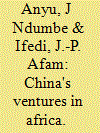

|
|
|
|
|
| Publication |
2008.
|
| Summary/Abstract |
Africa has a long and disturbing history with outside powers exploiting the continent for its natural and human resources in furtherance of their own economic and developmental objectives. In this essay, China's main objectives and the prospects and implications these have on Africa's development are examined. The authors argue that there are two very important perspectives-exploitation and opportunity-on China's role in Africa's development. The authors also argue that African countries must implement meaningful structural and policy changes that could enable them to leverage China's involvement to enhance their development. Whether Chinese interest and involvement brings the danger of renewed exploitation without accompanying sustainable development depends on the extent to which African countries are able to take advantage of the opportunities of this growing interest and transform themselves by circumventing the many economic, political, and social contradictions that are afflicting them.
|
|
|
|
|
|
|
|
|
|
|
|
|
|
|
|
| 2 |
ID:
085300
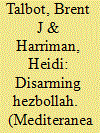

|
|
|
|
|
| Publication |
2008.
|
| Summary/Abstract |
Hezbollah has become a powerful yet destabilizing force in Lebanon, affecting internal stability, allowing Syria and Iran dangerous influence, delaying peace with Israel, and complicating the Israeli-Palestinian conflict. Moreover, it forces the United States to struggle between traditional support for Israel and newfound support for Lebanese democracy. The international community should capitalize on Hezbollah's damaged public image following its 2006 war with Israel and pursue a multiparty disarmament effort, to include incentives for the major regional players. The effort should address Hezbollah's continued presence in the Lebanese Parliament, international support for the Lebanese Armed Forces, return of the Golan to Syria in exchange for its cutting military support to Hezbollah, and a nonaggression agreement between Israel and Lebanon.
|
|
|
|
|
|
|
|
|
|
|
|
|
|
|
|
| 3 |
ID:
085298
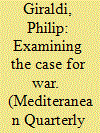

|
|
|
|
|
| Publication |
2008.
|
| Summary/Abstract |
Iran poses two fundamental challenges to the United States. First is its alleged program to develop a nuclear weapon, which is currently being negotiated and which might be managed and contained through concerted international action. Second, and more threatening in the long term, are its roles as a regional hegemon and as a participant in the political development of neighboring Iraq. Iran's policies in Iraq sometimes appear to be directly in conflict with US initiatives. In spite of considerable angry rhetoric, however, any actual evidence for Iranian hostile interaction in Iraq is highly speculative, and the White House has yet to make a case that Tehran's involvement is inappropriate or could serve as a casus belli.
|
|
|
|
|
|
|
|
|
|
|
|
|
|
|
|
| 4 |
ID:
085310
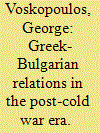

|
|
|
|
|
| Publication |
2008.
|
| Summary/Abstract |
The Balkan Peninsula has been an unstable regional security subsystem because of a number of defining and qualitative parameters, namely, overt or covert challenges to the territorial status, interethnic conflicts, the "great idea" syndrome, out-of-system interference, and minority expansionism. In the post-Cold War era, European Union enlargement in the area assisted the establishment of a core of systemic stabilizers that could, under certain conditions, absorb inherent instability. Greece and Bulgaria constitute an axis providing eufunctional input to the regional stability and security equation. Their partnership has been an example of inter-Balkan cooperation and an effort to establish an equilibrium mechanism to enhance the cohesion of the region
|
|
|
|
|
|
|
|
|
|
|
|
|
|
|
|
| 5 |
ID:
085299
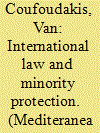

|
|
|
|
|
| Publication |
2008.
|
| Summary/Abstract |
In this essay a largely forgotten human rights issue involving the fate of the Greek-in-origin population that inhabited the Turkish islands of Imbros and Tenedos is examined. Exempted from the Greek-Turkish population-exchange agreements concluded following the end of World War I, the Greek population of the two islands was granted specific civic, cultural, and religious rights by the 1923 Treaty of Lausanne. The treaty remains valid to this day. Turkey deliberately violated the rights of this population because of its ethnicity, religion, and language. The author analyzes the methods used by Turkey to ethnically cleanse the two islands and the options available to the former residents of these islands as well as to the governments of Greece and Turkey to resolve the documented violations of the Treaty of Lausanne and of the European Convention on Human Rights.
|
|
|
|
|
|
|
|
|
|
|
|
|
|
|
|
| 6 |
ID:
085320


|
|
|
|
|
| Publication |
2008.
|
| Summary/Abstract |
In this essay the origins, dimensions, and implications of Kenya's election crisis of 2007 and the key actors who contributed to it are examined. The author reviews the efforts undertaken by the African Union and the former secretary-general of the United Nations, Kofi Annan, and offers specific recommendations to prevent reoccurrence of turmoil in
|
|
|
|
|
|
|
|
|
|
|
|
|
|
|
|
| 7 |
ID:
085308


|
|
|
|
|
| Publication |
2008.
|
| Summary/Abstract |
The support of the United States and some European Union countries for Kosovo's unilateral declaration of independence has in many ways contributed to a deterioration of the security situation in southeastern Europe. The fundamental strategic assumption of promoters of Kosovo's independence-that Kosovo was the last open question left over from the breakup of Yugoslavia-is likely to prove wrong. Thus, given the breakdown in the international and regional consensus on the contours of a legitimate Balkan political and security order, the instability of Kosovo and other states in the region is in reality likely to increase in the post-Kosovo independence period.
|
|
|
|
|
|
|
|
|
|
|
|
|
|
|
|
| 8 |
ID:
085314


|
|
|
|
|
| Publication |
2008.
|
| Summary/Abstract |
When and how did the characterization nationalist become an epithet that indicates abuse or contempt? The most obvious advent of the new usage may be found in the journalism and academic writing about the civil wars (1991-95) that doomed the existence of Yugoslavia. Employing nationalist as a negative quantity was made even more explicit by attaching intensifying prefixes such as "ultra" or "extreme." Searches of newspaper and other archives show that nationalist as a denunciatory epithet has continued in the media to the present day, especially as applied to Serbian politicians. It has also begun to infect the discourse among the political parties in Serbia.
|
|
|
|
|
|
|
|
|
|
|
|
|
|
|
|
|
|
|
|
|